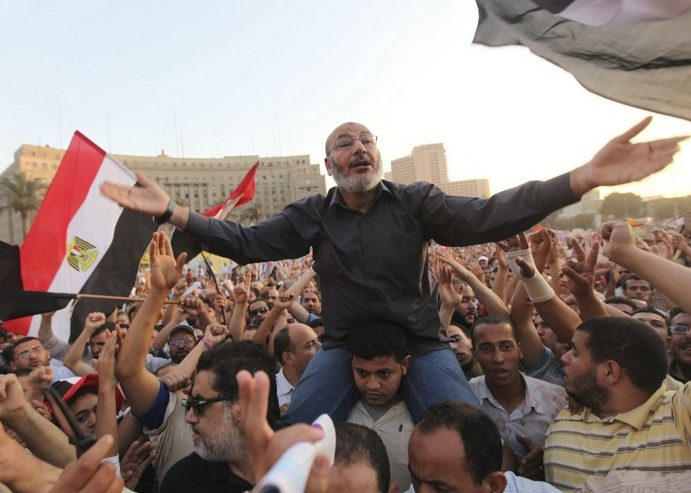
"Someone is pulling us into side battles and saying 80 percent of the people who were in front of Al-Ittahadeya yesterday and the past days were Copts. We and Copts are partners in the homeland and we will not be dragged into sectarian strife,” said Khairat El Shater, deputy chairman of the Muslim Brotherhood in a press conference last week. El Shater’s statement was telling and encapsulated the attitude of the Muslim Brotherhood’s language and public approach to much of the political opposition that they have faced going into the referendum.
"El Shater briefly addressed Copts in his 23 minute long address right after making claims that remnants of the former regime were mobilizing against the country. These statements were quickly followed by accusations that the media was accentuating the current strife. The misconception that Egypt’s Christians are some sort of “third party” or objects of mobilization against President Mohamed Morsi has been repeated and accepted as truth by many Islamist groups.
Two days after fatal clashes at the presidential palace, senior FJP member Mohamed al-Beltagy appeared on the Muslim Brotherhood-owned Misr 25 channel to discuss the fallout with host Sherif Mansour. During the segment al-Beltagy claimed over 50 to 60 percent of those who had gathered at the palace against President Mohamed Morsi were Christian, and advised them to “not be used” by former regime figures against the Brotherhood, acknowledging the view many of his colleagues have of Christians as a single voting bloc that is easily manipulated.
Al-Beltagy also listened to Mansour relay unfounded rumors of weapons coming from the Shubra, a neighborhood heavily populated with Christians, used to attack Muslim Brotherhood demonstrators.
Last Tuesday at a mass demonstration supporting the president, Safwat Hegazy, who was appointed a member of the National Human Rights Council in September, delivered a vitriolic rant directed at opposition forces, singling out Egypt’s Christians and the Coptic Church.
“I say to the Church: yes, you are our brothers in this homeland. But there are red lines. Our red line is the legitimacy of Dr. Mohamed Morsi. Whoever splashes it with water, we will splash with blood.”
Sectarianism surrounded a number of events on the first day of the constitutional referendum on Saturday. The Muslim Brotherhood’s electoral committee accused the Coptic Church of mobilizing nuns to vote against the draft constitution, a claim the Brotherhood had made in June when they accused the Church of using nuns to boost votes for Ahmed Shafiq. Reports surfaced of a polling station in Nasr City not allowing Christian women to enter to submit their ballots.
The group’s official website published a story claiming Coptic voters in Sohag received text messages telling them to vote “no” against an Islamic state in order to help them achieve a Coptic state.
Through its official statements and calculated public appearances, the Muslim Brotherhood creates an image as a group that seeks to repair damage caused between communities of different faiths in Egypt. In reality, it needs the divide to last. As long as the split exists, it can be used as a talking point used to convey tolerance. On the other hand it can be used to rally support within existing bases who are driven by antagonism of a group seen as “different” and unpatriotic.
The Muslim Brotherhood and many Islamic currents have repeatedly stated they have nothing to do with the sectarianism that has continued to brew in Egypt. When approximately 100 Christians were forced to flee from their homes in Dahshur in July, Amr Darrag of the FJP dismissed the events as non-sectarian. During the Brotherhood’s "charm offensive" in the United States last March former MP Abdel Mawgoud Darrag told CNN that sectarian strife was a "media myth." While Mubarak’s reign and its complicity saw an increase in sectarian discrimination and violence, elements of the "old regime" are still blamed for similar events after the revolution.
So in his statement, El Shater was right. There are those attempting to pull the country into “side battles.” But perhaps he should check his own ranks before allocating blame elsewhere.
Basil El-Dabh is a reporter for Daily News Egypt. He graduated from Georgetown University with a Bachelor of Arts degree in Political Economy. He is an Egyptian American and moved to Cairo in 2010.
Photo Credit: Reuters
Image: Safwat%20Hegazy%20Reuters.jpg
